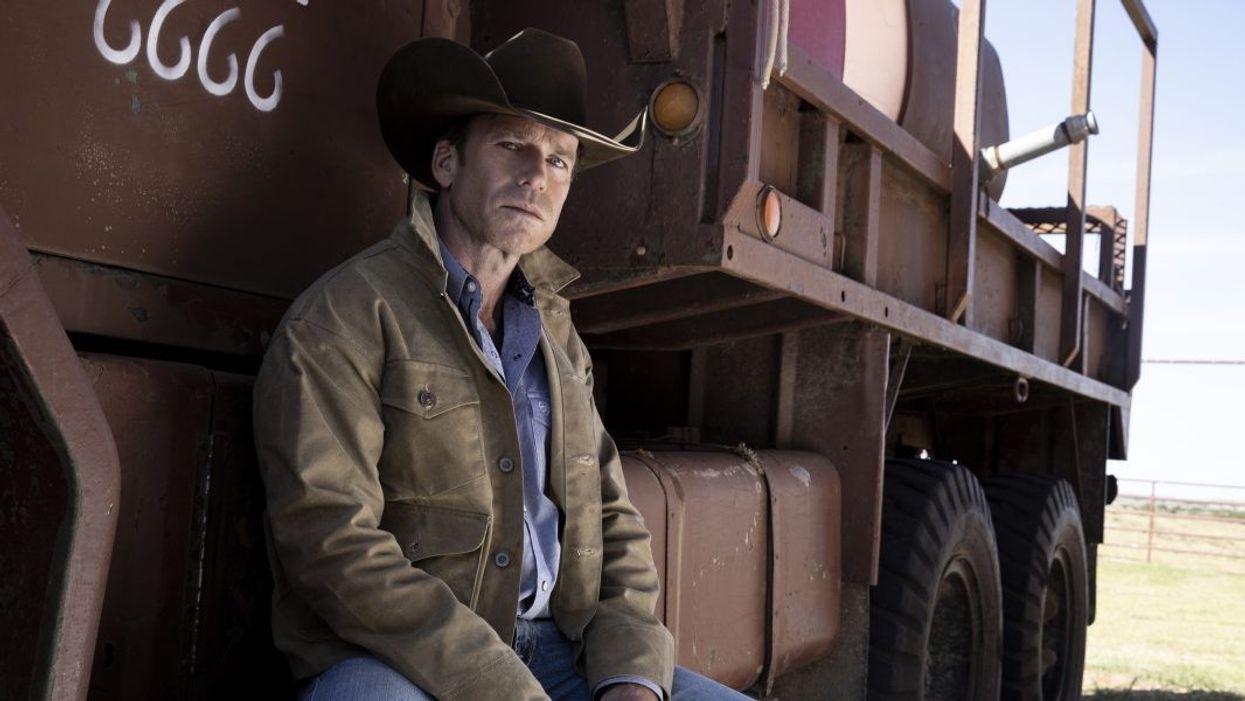Why Haven't Writers Rooms Worked for 'Yellowstone' Creator Taylor Sheridan?
Writers' rooms are a staple of TV except for the medium's most popular show.

Odds are, you're one of the tens of millions of people watching Yellowstone or one of its spin-off series on Paramount+. The show exploded onto the scene a few years ago and became a cultural landmark, without winning any major awards.
It's the story of a family trying to keep their ranch amidst many outside forces getting in their way.
The show was created by Taylor Sheridan, a cowboy turned actor turned writer whose work has become the backbone of a streaming service and whose stories have reignited viewers' interest in the West and modern Westerns.
Sheridan is a bit of a firebrand, preferring to shake things up and shoot from the hip.
In a recent interview with The Hollywood Reporter, Sheridan unfolded the story of how Yellowstone came to be. It was an HBO show that they had no idea what to do with, but had champions who, when they left the network, helped him get his show back and make it for a then-unheard-of Paramount channel.
Since then, the show has out-rated Monday Night Football and become the biggest and most expensive series on TV, with episodes costing $10-15 million.
You would think a TV show like this would come with a lot of strings attached, especially with the cost, but Sheridan has retained creative control. He still writes every episode. Yes, even with what seems like a dozen projects going at once (counting movies and spin-offs and new series) he still stops to write every episode.
Apparently, he writes multiple in a day.

When it comes to writing in a traditional room, Sheridan balks at the idea. He told THR, “My stories have a very simple plot that is driven by the characters as opposed to characters driven by a plot—the antithesis of the way television is normally modeled. I’m really interested in the dirty of the relationships in literally every scene. But when you hire a room that may not be motivated by those same qualities—and a writer always wants to take ownership of something they’re writing—and I give this directive and they’re not feeling it, then they’re going to come up with their own qualities. So for me, writers' rooms, they haven’t worked.”
Now, on most TV shows, even hands-on showrunners take their time to impart their passion to the other writers in the room and teach people or compromise. Or they hire people with similar backgrounds or expertise to help them break the story.
But not Sheridan. Compromise is not on the table.
He said, “I spent the first 37 years of my life compromising. When I quit acting, I decided that I am going to tell my stories my way, period. If you don’t want me to tell them, fine. Give them back and I’ll find someone who does—or I won’t, and then I’ll read them in some freaking dinner theater. But I won’t compromise. There is no compromising.”
It's this kind of blunt talk that can rub people the wrong way and has many times.
Sheridan clarified his compromise comments, saying, “There is compromising on things like budget,” but he also quickly took that back. He continued, “You write a thing and it costs what it costs. I will not change a script to meet a budget. You read the scene [in his Yellowstone prequel 1883] where the wagons go across the river when you decided to green light it. So don’t pitch me an idea where we see them before the river and after the river. That’s not what I do. You read it, you had every chance to say no.”
Still, there is something electric when Sheridan doubles down and pronounces the writer as king. Something undeniable about the idea is that you can get your TV show on the air with total authority over where it goes (even if this isn't the way many would like to make it).

Sheridan told THR, “The freedom of the artist to create must be unfettered.”
Again, this is fun in a vacuum, but TV has always been a collaborative medium. Some writers, including myself, think that stretching yourself over many shows, writing every episode, may affect the quality of your work especially when all these shows get to air and have insane production schedules.
There's also the WGA strike, of which one of the demands made by writers is mandatory minimums when it comes to staffing in TV.
What does a guy who writes every episode think about that?
Sheridan said, “If they tell me, ‘You’re going to have to write a check for $540,000 to four people to sit in a room that you never have to meet,’ then that’s between the studio and the guild. But if I have to check in creatively with others for a story I’ve wholly built in my brain, that would probably be the end of me telling TV stories.”
I think while many have taken this as arrogance, there's a softer way to see these direct words. Sheridan wants to control the show's narrative and would be open to ideas, but ultimately wants to be the boss. But that just might be me projecting.
TV has always been a medium where people work together to make something special. In his interview, Sheridan talks about caring about his crew and crafty and their work. But I also think being rigid to one way of doing things, even if it has undeniably worked in the past, isn't the best way forward.
Collaboration can be special and fruitful if you build a room full of people you believe in and empower with your vision.
Let me know what you think of all this in the comments.
Source: The Hollywood Reporter











